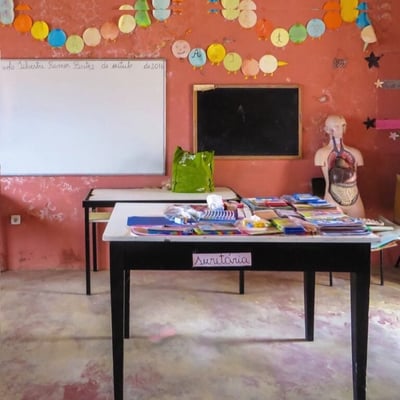1
00:00:03,256 –> 00:00:04,256
Tiago: Cláudia?
{{Tiago: Claudia?}}
2
00:00:04,256 –> 00:00:05,816
Cláudia: Olá, Tiago!
{{Claudia: Hello, Tiago!}}
3
00:00:05,816 –> 00:00:07,436
Há quanto tempo!
{{It’s been a while!}}
4
00:00:07,436 –> 00:00:09,596
Tiago: É verdade!
{{Tiago: Indeed!}}
5
00:00:09,596 –> 00:00:12,756
Nunca pensei encontrar-te aqui, em Lisboa.
{{I never thought I’d run into you here, in Lisbon.}}
6
00:00:12,756 –> 00:00:14,956
Cláudia: Eu moro aqui, agora.
{{Claudia: I live here now.}}
7
00:00:14,956 –> 00:00:17,636
Tiago: Então? Arranjaste emprego aqui?
{{Tiago: So, did you get a job here?}}
8
00:00:17,636 –> 00:00:22,136
Cláudia: Sim, trabalho na Escola D. Filipa de Lencastre.
{{Cláudia: Yes, I work at the D. Filipa de Lencastre School.}}
9
00:00:22,136 –> 00:00:23,436
Ensino inglês.
{{I teach English.}}
10
00:00:23,436 –> 00:00:25,735
Tiago: Que bom… conseguiste!
{{Tiago: That’s good… you did it!}}
11
00:00:25,736 –> 00:00:27,056
Parabéns!
{{Congratulations!}}
12
00:00:27,056 –> 00:00:28,456
Cláudia: Obrigada!
{{Cláudia: Thank you!}}
13
00:00:28,476 –> 00:00:30,516
E tu, o que fazes agora?
{{And you, what do you do now?}}
14
00:00:30,516 –> 00:00:33,236
Tiago: Eu tenho uma banda com a Rita.
{{Tiago: I have a band with Rita.}}
15
00:00:33,236 –> 00:00:35,835
Eu toco guitarra e ela canta.
{{I play guitar and she sings.}}
16
00:00:35,835 –> 00:00:37,536
Cláudia: Que giro!
{{Cláudia: How cool!}}
17
00:00:37,536 –> 00:00:39,336
Está a correr bem?
{{Is it going well?}}
18
00:00:39,336 –> 00:00:40,696
Tiago: Muito!
{{Tiago: Very!}}
19
00:00:40,696 –> 00:00:44,636
Tocamos todas as sextas-feiras, num bar no Cais do Sodré
{{We play every Friday at a bar in Cais do Sodré}}
20
00:00:44,656 –> 00:00:47,475
e todas as semanas está a abarrotar.
{{and every week it’s packed.}}
21
00:00:47,475 –> 00:00:51,866
Cláudia: Esta sexta-feira vou ver-vos e levo os meus irmãos.
{{Claudia: This Friday I’m going to see you and I’ll take my brothers.}}
22
00:00:51,866 –> 00:00:53,216
Tiago: Boa!
{{Tiago: Good!}}
23
00:00:53,216 –> 00:00:54,676
Eles também moram cá?
{{They live here too?}}
24
00:00:54,686 –> 00:00:58,386
Cláudia: Sim, eles estudam na Faculdade de Direito.
{{Cláudia: Yes, they study at the Law School.}}
25
00:00:58,386 –> 00:01:01,646
Tiago: Uau, já estão na faculdade…
{{Tiago: Wow, they’re already in college?}}
26
00:01:01,646 –> 00:01:03,056
O tempo voa!
{{Time flies!}}
27
00:01:03,056 –> 00:01:07,416
Cláudia: Sim, mas eles continuam os mesmos.
{{Claudia: Yes, but they are still the same.}}
28
00:01:07,416 –> 00:01:13,296
Devias ver-nos em casa… eu arrumo e eles desarrumam.
{{You should see us at home… I clean up and they make a mess.}}
29
00:01:13,296 –> 00:01:16,176
Tiago: E continuas a gritar muito com eles?
{{Tiago: And are you still yelling at them a lot?}}
30
00:01:16,186 –> 00:01:21,356
Cláudia: Não, não… sou uma pessoa mais paciente agora.
{{Claudia: No, no… I’m a more patient person now.}}
31
00:01:21,356 –> 00:01:24,386
E eles ajudam-me quando preciso.
{{And they help me when I need [it].}}
32
00:01:24,386 –> 00:01:26,776
Tiago: Ok, assim está melhor.
{{Tiago: Okay, that’s better.}}
33
00:01:26,776 –> 00:01:28,716
Cláudia: Olha, gostei de te ver.
{{Claudia: Look, it was good to see you.}}
34
00:01:28,716 –> 00:01:32,316
Temos de combinar um café para pormos a conversa em dia!
{{We have to arrange a coffee to catch up!}}
35
00:01:32,316 –> 00:01:33,556
Não concordas?
{{Don’t you agree?}}
36
00:01:33,556 –> 00:01:35,536
Tiago: Concordo, claro.
{{Tiago: I agree, of course.}}
37
00:01:35,536 –> 00:01:38,516
Pode ser na sexta-feira, antes do concerto.
{{It could be on Friday, before the concert.}}
38
00:01:38,516 –> 00:01:40,756
A Rita também vai gostar de te ver.
{{Rita will also like to see you.}}
39
00:01:40,756 –> 00:01:42,976
Cláudia: Diz-lhe que lhe mando um beijinho.
{{Claudia: Tell her I send her a kiss.}}
40
00:01:42,976 –> 00:01:45,056
Tenho tantas saudades dela!
{{I miss her so much!}}
41
00:01:45,066 –> 00:01:46,386
Tiago: Digo, sim.
{{Tiago: I’ll tell [her], yes.}}
42
00:01:46,386 –> 00:01:49,756
Aponta o meu número para nos encontrarmos na sexta-feira.
{{Write down my [phone] number so we can meet on Friday.}}
 We respect your privacy and have a ZERO TOLERANCE for spam.
We respect your privacy and have a ZERO TOLERANCE for spam.
















ola, boa tarde
Temos de combinar um café para pormos a conversa em dia!
Nesta frase, pormos fica juntos, sff
obg
Aqui, a frase “para pormos a conversa em dia” traduz-se literalmente para “for us to put the conversation up to date”, em inglês. Isto, de forma mais idiomática, significa “to catch up”, neste contexto específico. Não sei se respondi à tua questão, porque não a percebi muito bem, mas se precisares de mais esclarecimentos, avisa 🙂
Excellent talk! I really liked it as it is chit-chat talk and real example of daily conversation!
I agree, I was thinking same thing. These conversations really help with real world applications.
Boa tarde,
qual é a diferença entre ça e aqui ?
Obrigada,
Ellen
Hi Ellen! Both mean “here”, but aqui usually refers to a more precise location, whereas cá refers to a more general location. This Learning Note will give you some more information and examples: Adverbs of Place. I hope that helps!
Excellent “shortie”. Very clear and well spoken, with some really good vocabulary for a relative beginner like myself! Thank You.
The conversations at this level are the most useful activities for speaking in the real world.
Thanks
Thanks Don! So glad to hear this
The last sentence “aponta o meu número para nos encotramos na sexta-feira” wondering if we must say “encontrarmos” , right?
Yes, you’re right, and they do say it in the audio. Just a typo in the transcript, which is already fixed. Thanks for spotting it!
Foi muito giro a conversa de hoje… Gostaria de tocar numa banda para o meu trabalho em vez de sentar-me no escritorio todo o dia…
In lesson 3 of this unit. How does one differentiate between launch and throw as in ‘Ele lança o seu livro?’ Or does this depend on the circumstances. ” Cuidado professor!”
Appreciate this shortie….
I listened to it twice without looking at the screen and then listened to it a third time while following along on the screen. I’m pretty good at guessing (or choosing the most correct) answers, but this time, I felt like I UNDERSTOOD the questions and KNEW all the answers. I’m not sure if I’m getting better or if this was an easier shortie. Regardless – thank you — I have definitely progressed! 🙂
That’s so nice to hear, congratulations! It sounds like you’re making progress! 😊
Why isn’t the phrase “Temos de combinar um café para pormos a conversa em dia!?” using the verb conjugated as “pomos” (we will put)?
“Pormos” is the infinitive form: “para pormos” = “in order to put”
The future form of “we will put” would be “nós poremos”.
“Nós pomos” / “we put” is the simple present form.
I’m sorry but this doesn’t make sense to me. First of all, are we taking about the verb Pôr, “to put?” That is the infinitivo (infinitive form). I have never seen the verb “pormos” or seen pôr conjugated in this way. Is this some version of “pôr-nos?” I’m lost here.
Yes, this is the verb pôr, which is part of the phrase pôr a conversa em dia. A literal translation would be to put the conversation in date, but it basically means to catch up with someone.
Pormos is conjugated in the personal infinitive, which comes up in a later unit: https://www.practiceportuguese.com/units/main/personal-infinitive/
It’s sort of like saying We should get coffee in order (for us) to catch up.
The personal infinitive is generally used when you might think to use the “regular” infinitive (i.e. pôr – the impersonal infinitive), but when there is more emphasis on a known subject. In this case, we know that the subject is we / us, since temos was used earlier in the sentence.
It’s a little tricky to learn when to use this (as opposed to just pôr), because the rules are not very straightforward. For now, just be aware of it, and then it will come up again later in the Personal Infinitive unit.
What is said after the opening words “Practice Portuguese” of each dialogue. I hear ‘om tu com’ Huh?
Rui says “ponto com” which means “dot com”! As in PracticePortuguese.com
Here: https://help.practiceportuguese.com/article/69-what-did-rui-say
🙂
In a lesson you translate “he cries when seeing films” as “ele chora a ver filmes”. What is the grammar of “a ver” here? Why not: ….ao ver filmes? Or …….quando ele vê filmes?
Thanks,
The phrase “ele chora a ver filmes” is an example of a common construction in Portuguese where the preposition “a” is used before an infinitive verb to express the idea of “when doing something” or “while doing something”. It’s a more concise way to convey the same meaning as “quando ele vê filmes” (when he watches movies), which is also correct.
Using “ao ver filmes” would also be correct, and it’s a contraction of “a” + “o” (to the), which is another way to link the action of crying to the action of watching films. Both “a ver filmes” and “ao ver filmes” are grammatically correct, but they might carry very slightly different nuances.
“A ver filmes” is most certainly the most common way to convey the general idea of crying when watching films/movies. 🙂